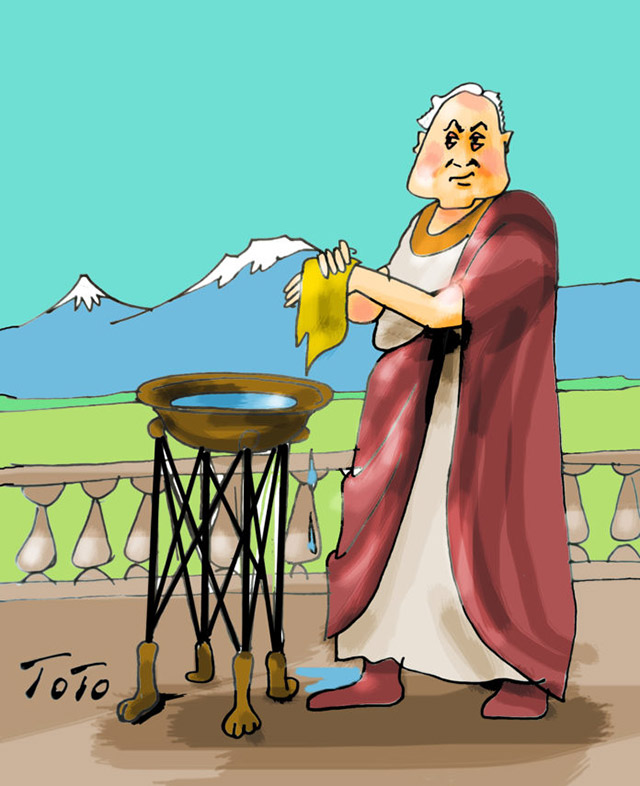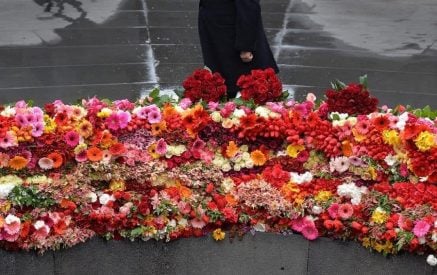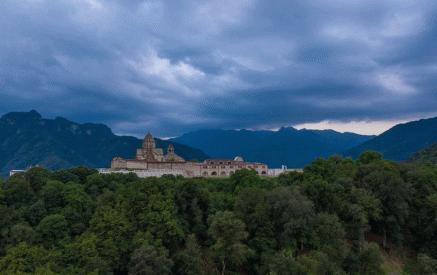by Edmond Y. Azadian
The Armenian Mirror-Spectator
President Armen Sarkissian’s resignation dominates almost all headlines in the Armenian news media. One question raised is whether now is the proper time to trigger another crisis. After all, Armenia has been experiencing an extended period of unrest since the recent war and faces the most challenging problems in dealing with a stubborn enemy.
In addition, Armenia is facing another challenge — an own-goal of sorts — with the prospect of negotiating with Turkey to tackle century-old issues.
Read also
President Sarkissian must have considered the above problems, but they still did not deter him from submitting his resignation.
The president has cited several reasons for his decision, which may not reveal the entire truth. It would be redundant to quote all those reasons cited in his resignation statement, as they have been fully covered by the media.
One of the major complaints was the constitutional limitation of the presidential office, allowing the president only a limited role in carrying out protocol. Even those functions were sometimes taken over by Prime Minister Nikol Pashinyan – for example, the prime minister’s eulogy at Charles Aznavour’s funeral in Paris in 2018, where French President Emmanuel Macron was the other speaker.
Sarkissian has complained about the “lack of tools to perform a significant role in the state.”
When I met the president last June, he laid out all his objections about the current constitution, his complaints almost repeated verbatim in the statement released this week, but he gave no indication that he thought about quitting his job. In fact, he assured me that he had cut a deal with Pashinyan to have the current constitution revised in October 2021.
It seems that the exasperated president realized that Mr. Pashinyan had no inclination to change the constitution. And indeed, following the president’s resignation, Mr. Pashinyan gave an extensive press conference, covering a plethora of issues, among them the issue of constitutional changes. He stated that he had appointed a committee to study constitutional changes, but, at this time, he saw no need for any changes.
The current parliamentary constitution was drafted by former President Serzh Sargsyan, and it was tailor-made for him. The current constitution calls for a super prime minister, a position which was inherited by Pashinyan and he has been guarding it jealously since assuming office in 2018 by overthrowing Sargsyan.
President Sarkissian’s resignation was greeted gleefully by the pro-government press. Many of the members of the government interviewed were unanimously critical of the president’s performance. Even Pashinyan, during his press conference, expressed relief and further explained that his party will certainly elect a replacement by the second round of a parliamentary vote if they fail in the first round. The deck is stacked in his favor; the ruling Civil Contract party has 79 members in parliament and 81 are needed to elect the president in the first round.
Pashinyan stopped short of naming his candidate but he assured the public that the candidate will be from the ruling party’s ranks. To justify his choice, Pashinyan stated that the president has to work harmoniously with his government.
All along, Pashinyan has been advocating this idea, holding obedience over competence, while the president was complaining of the need for a system of checks and balances in a democratic country.
Armenian society is extremely polarized and that situation affects the entire political spectrum. However, surprisingly, there seem to be unanimity of views about the president’s resignation. Indeed, many of the opposition leaders, interviewed by the media, expressed critical views about the president’s performance, though for different reasons.
The news media is extremely biased and polarized. One thing the diaspora can provide to Armenia is objective coverage of news and fact-based and independent commentary. So often in Armenia the stories seem to be devoid of concrete facts and are instead rife with rumors.
There are few unbiased analysts and objective commentators but their fare has few takers in a desperately divided society. Each camp savors the diatribe spewed by his side and this situation characterizes the political culture of the country. Unfortunately, in this climate, the government is taking advantage and starting to silence the free press.
Kapil Komireddi, an independent writer, in an article in the Spectator World, provides the following comparison between the president and the prime minister: “Pashinyan is an exceptional figure in world politics for what he has achieved in this part of the world. He is sincere and idealistic but he can be incredibly persistent and stubborn. Sarkissian is in a different league. He is a scientist. He’s a capitalist but he did not have his finger in the pie here. He made his fortune by working hard in the West, a Soviet Thatcherite who wants Armenia to turn into the Israel of the Caucasus. He cultivated really strong relationships as a diplomat. With the exception of [Recep Tayyip] Erdogan and [Ilham] Aliyev and maybe Imran Khan, he can get a meeting with almost any world leader. For a tiny country, that is a huge asset. He was just not utilized during the war. He tried to do his best — he reached out to everybody — but he was sidelined and constrained within Armenia. The prime minister ran the show. And it was, I am sorry to say, a disaster from start to finish.”
Unfortunately, very few citizens in Armenia share this view. From the first day of Sarkissian’s appointment, he was characterized as a “British spy” or a “Russian agent,” depending on one’s tastes and political agenda.
Incredibly, the president learned about the war in 2020 from the news media. The disconnect was that deep within the government.
The president, through his broad contacts, brought in significant investments into the country. But it looks like nobody needed or appreciated that kind of help.
One thing was obvious from the onset: he was a holdover from the old regime. Pashinyan’s team has never been interested in experience; all it needs is obeisance.
In addition, provincialism is rife in the country’s political culture as evidenced by loutish debates in the parliament.
I will hazard to extrapolate from the same situation which applies to Armenia’s musical life. Over the years, Armenia has lost many world-class musicians and conductors from the diaspora who left the country in disgust. Among them are stars such as Valery Gergiev, Ohan Durian, Aram Gharabegian, Loris Tjeknavorian and Constantine Orbelian.
Provincialism is the standard and society cannot connect with the extraordinary. We can see that trend spill over into politics. This may be symptomatic of small countries that have little tolerance for global celebrities.
One of the president’s complaints was that prominent talents from diaspora could not get involved in Armenia because of constitutional constraints. He cited the example of Noubar Afeyan, the man behind the Moderna COVID vaccine.
During the Velvet Revolution, President Sarkissian played a moderating role; although Serzh Sargsyan had installed him in the president’s office, he had the audacity to call on him to resign. “That was a wise move,” Sarkissian said. But on the other hand, he made a fatal mistake of calling on Pashinyan to resign during the turmoil resulting from the 2020 war. It was not his place to join the masses calling for the premier’s resignation, just as it was not the place of Catholicos of All Armenians Karekin II to do so. It was a moment where these leaders could play a crucial role by extolling unity. Those calls were never forgotten by Pashinyan’s team, and therefore today, no tears are shed for the president.
In accordance with the constitution, the new president will be elected in February.
Pashinyan was looking for such an occasion to get someone from his own team to the post to further consolidate his grip over the government, after pushing the old guard out of the constitutional court and placing his own supporters in the Foreign Ministry and Defense Ministry ranks.
Pashinyan’s decision not to change the constitution means a brief reprieve from giving in to Turkish demands to delete the reference to Historic Armenia or Western Armenia, although he shirked his responsibility for Genocide recognition. He said recently that Hay Tad has never been on the government’s agenda. The locomotive of the Hay Tad has been the diaspora, he added, a statement which has to be taken with a grain of salt. Indeed, after President Robert Kocharyan made the recognition of the Genocide a part of Armenia’s foreign policy agenda, a number of countries recognized it, with the most recent being the United States.
Now Armenia has to prepare itself for fateful negotiations with Turkey and with Azerbaijan.
In the case of a failure, maybe the president will regret his decision forever, mistiming his resignation at a very crucial juncture in Armenian history.




























































